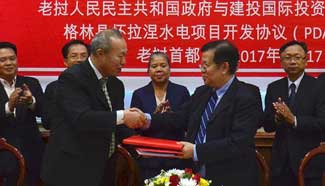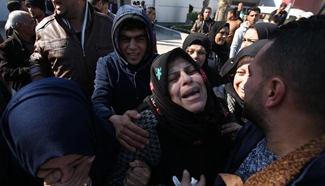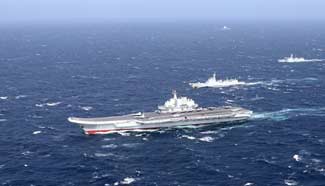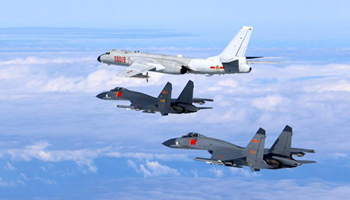BRUSSELS, Feb. 18 (Xinhua) -- In a burst of diplomacy, the United States has spent the past week trying to reassure allies on its commitment to European and global security, while also admonishing their partners on burden-sharing.
It began Wednesday with U.S. Defence Secretary James Mattis making a much-anticipated speech at the North Atlantic Treaty Organization (NATO) council of defence ministers in Brussels, warning his counterparts that the Americans would revise their relationship with the security alliance if other partners didn't pay their fair share.
Many NATO members had been anxious for the official U.S. stance since January, when then-President-elect Donald Trump called NATO "obsolete" for having been "designed many, many years ago," for not adequately adapting to the threat of terrorism, and for countries not paying "what they should."
Retired General and former NATO Supreme Allied Commander Mattis appeared to give a chastising, if slightly more reasonable, version of Trump's off-the-cuff position. It was no longer acceptable, Mattis declared, for American taxpayers to carry a "disproportionate share of the defence of Western values."
He spoke in reference to a defence spending shortfall, with only five members of the alliance -- Estonia, Greece, Poland, Britain and the United States -- reaching an agreed target of 2 percent of GDP level.
NATO Secretary General Jens Stoltenberg tried to contextualize the situation in a Wednesday press conference, arguing that 22 alliance members had increased their defence spending budgets in 2016, for an increase of approximately 10 billion U.S. dollars, before reminding listeners all alliance members had committed at the 2014 NATO Wales Summit to reaching the 2 percent target by 2024.
The Americans' "tough talk," however, dominated the news cycle, with collective worries printed across Europe that the United States would pull out of NATO if other members didn't hurry up and reduce the defence spending shortfalls.
In what could then seem like a response, Defence Secretary Mattis and United States Vice President Mike Pence both separately made statements of reassurance during this year's Munich Security Conference, telling allies that the United States wasn't going to turn its back on them.
"American security is permanently tied to the security of Europe," Mattis said on Friday in Munich.
For his part, Pence went further on Saturday, telling allies in Munich, "Today, on behalf of President Trump, I bring you this assurance. The United States of America strongly supports NATO and will be unwavering in our commitment to our transatlantic alliance."
"The fates of the United States and Europe are intertwined," continued the U.S. vice president on his first trip abroad since taking office. "Your struggles are our struggles. Your success is our success. And ultimately, we walk into the future together."
But Mike Pence still echoed earlier warnings, saying: "The promise to share the burden of our defence has gone unfulfilled for too many for too long."
While some European countries, notably Poland, have responded well to the American position, not all leaders have been particularly impressed.
European Commission President Jean-Claude Juncker dismissed the U.S. stance in a Thursday speech in Munich, saying, "It has been the American message for many, many years. I am very much against letting ourselves be pushed into this."
"Europeans must bundle their defense spending better and spend the money more efficiently," he continued, making reference to his support for the creation of a European Defence Union, a reminder that pooled European defence resources may be an alternative to relying on an unpredictable American government.
German Chancellor Angela Merkel asked on Saturday, "Will we be able to continue working well together, or will we all fall back into our individual roles?"
She went on to praise multilateral cooperation and to admit that U.S. military force was necessary in the fight against the Islamic State, but calls for the inclusion of partners from Islamic-majority countries were a reminder to her audience that she was not willing to accept American policies she disagreed with for the sake of security.
French Foreign Minister Jean-Marc Ayrault, meanwhile, deplored in a Saturday tweet that Pence had not mentioned one word about the European Union (EU) in his speech, even though the American vice president is set to meet with EU leaders on Sunday in Brussels.
The fact that Donald Trump's messengers show little patience for European budgetary problems, a difficulty partially caused by the American subprime mortgage crisis, will not endear the American president to European leaders committed to reviving the EU economy.
In any relationship, mixing threats with messages of reassurance has a name: manipulation. For many Europeans, it will be clear that the United States is trying to manipulate the security relationship it has with the continent, threatening to pull back from alliances, then reassuring allies of its "unwavering" commitment.
Pushed too far, European allies might come to agree with Donald Trump on NATO's obsolescence, opting instead for a European Defence Union, with pooled resources that are less dependent on the whims of an unconventional American leader and more clearly aligned with the interests of the EU itself.
What is certain is that a European continent that has dealt with a series of simultaneous and unprecedented threats -- economic crises, the refugee crisis, Brexit and the ongoing threat of terrorism on a previously unknown level -- will have limited patience for being scolded.
Related:
Spotlight: Tough U.S. demands for burden-sharing dominate NATO talks
BRUSSELS, Feb. 17 (Xinhua) -- Defense ministers of the North Atlantic Treaty Organization (NATO) ended their two-day talks in Brussels on Thursday whose agenda was dominated by discussions about increasing defense spending. Full story
Libya requests NATO assistance for military training, supports
TRIPOLI, Feb. 16 (Xinhua) -- Libya's UN-backed Government of National Accord has requested military training and development for its troops, NATO revealed on Thursday. Full story


















